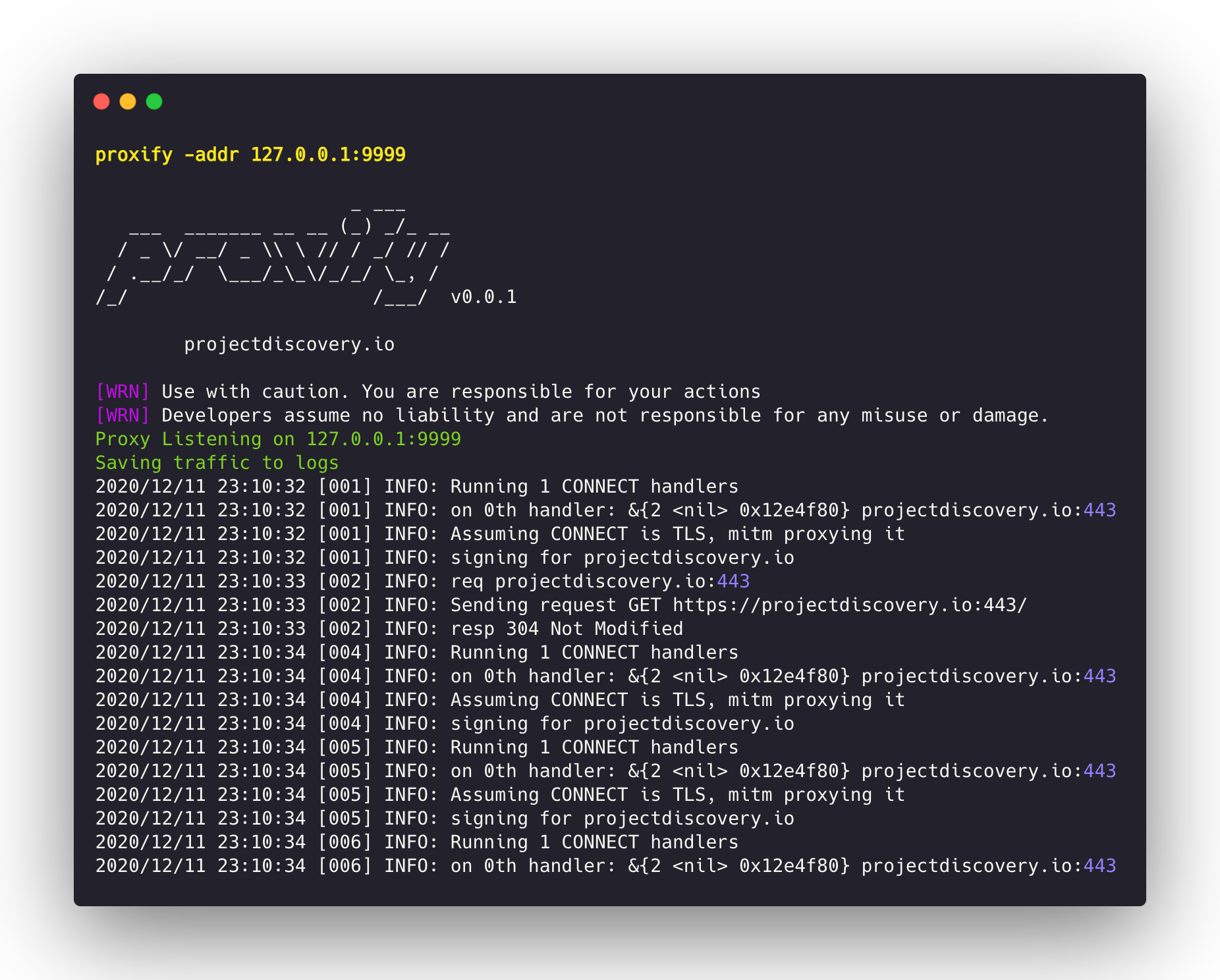Features • Installation • Usage • Running Proxify • Installing SSL Certificate • Applications of Proxify • Join Discord
Swiss Army Knife Proxy for rapid deployments. Supports multiple operations such as request/response dump, filtering and manipulation via DSL language, upstream HTTP/Socks5 proxy. Additionally a replay utility allows to import the dumped traffic (request/responses with correct domain name) into burp or any other proxy by simply setting the upstream proxy to proxify.
- Intercept / Manipulate HTTP/HTTPS & NON-HTTTP traffic
- Invisible & Thick clients traffic proxy support
- TLS MITM support with client/server certificates
- HTTP and SOCKS5 support for upstream proxy
- Traffic Match/Filter and Replace DSL support
- Full traffic dump to file (request/responses)
- Native embedded DNS server
- Plugin Support to decode specific protocols (e.g XMPP/SMTP/FTP/SSH/)
- Proxify Traffic replay in Burp
Download the ready to run binary or install/build using GO
go install -v github.com/projectdiscovery/proxify/cmd/proxify@latestproxify -hThis will display help for the tool. Here are all the switches it supports.
Usage:
./proxify [flags]
Flags:
OUTPUT:
-o, -output string Output Directory to store HTTP proxy logs (default "logs")
-dump-req Dump only HTTP requests to output file
-dump-resp Dump only HTTP responses to output file
FILTER:
-req-fd, -request-dsl string Request Filter DSL
-resp-fd, -response-dsl string Response Filter DSL
-req-mrd, -request-match-replace-dsl string Request Match-Replace DSL
-resp-mrd, -response-match-replace-dsl string Response Match-Replace DSL
NETWORK:
-ha, -http-addr string Listening HTTP IP and Port address (ip:port) (default "127.0.0.1:8888")
-sa, -socks-addr string Listening SOCKS IP and Port address (ip:port) (default "127.0.0.1:10080")
-da, -dns-addr string Listening DNS IP and Port address (ip:port)
-dm, -dns-mapping string Domain to IP DNS mapping (eg domain:ip,domain:ip,..)
-r, -resolver string Custom DNS resolvers to use (ip:port)
PROXY:
-hp, -http-proxy string Upstream HTTP Proxies (eg http://proxy-ip:proxy-port
-sp, -socks5-proxy string Upstream SOCKS5 Proxies (eg socks5://proxy-ip:proxy-port)
-c int Number of requests before switching to the next upstream proxy (default 1)
EXPORT:
-elastic-address string elasticsearch address (ip:port)
-elastic-ssl enable elasticsearch ssl
-elastic-ssl-verification enable elasticsearch ssl verification
-elastic-username string elasticsearch username
-elastic-password string elasticsearch password
-elastic-index string elasticsearch index name (default "proxify")
-kafka-address string address of kafka broker (ip:port)
-kafka-topic string kafka topic to publish messages on (default "proxify")
CONFIGURATION:
-config string Directory for storing program information (default "/Users/geekboy/.config/proxify")
-cert-cache-size int Number of certificates to cache (default 256)
-allow string Allowed list of IP/CIDR's to be proxied
-deny string Denied list of IP/CIDR's to be proxied
DEBUG:
-silent Silent
-nc, -no-color No Color (default true)
-version Version
-v, -verbose VerboseRuns a HTTP proxy on port 8888
proxifyRuns a HTTP proxy on custom port 1111
proxify -http-addr ":1111"Runs a HTTP proxy on port 8888 and forward the traffic to burp on port 8080
proxify -http-proxy http://127.0.0.1:8080Runs a HTTP proxy on port 8888 and forward the traffic to the TOR network
proxify -socks5-proxy socks5://127.0.0.1:9050Dump all the traffic into separate files with request followed by the response.
proxify -output logsAs default, proxied request/resposed are stored in the logs folder. Additionally dump-req or dump-resp flag can be used for saving specfic part of the request to the file.
Proxify supports embedding DNS resolver to map hostnames to specific addresses and define an upstream dns server for any other domain name
Runs a HTTP proxy on port 8888 using an embedded dns server listening on port 53 and resolving www.google.it to 192.168.1.1 and all other fqdn are forwarded upstream to 1.1.1.1
proxify -dns-addr ":53" -dns-mapping "www.google.it:192.168.1.1" -dns-resolver "1.1.1.1:53"This feature is used for example by the replay utility to hijack the connections and simulate responses. It may be useful during internal assessments with private dns servers. Using * as domain name matches all dns requests.
If the request or response match the filters the dump is tagged with .match.txt suffix:
proxify -request-dsl "contains(request,'firefox')" -response-dsl "contains(response, md5('test'))"Proxify supports modifying Request and Responses on the fly with DSL language.
proxify -request-match-replace-dsl "replace(request,'firefox','chrome')" -response-match-replace-dsl "regex(response, '^authentication failed$', 'authentication ok')"Replay all the dumped requests/responses into the destination URL (http://127.0.0.1:8080) if not specified. For this to work it's necessary to configure burp to use proxify as upstream proxy, as it will take care to hijack the dns resolutions and simulate the remote server with the dumped request. This allows to have in the burp history exactly all requests/responses as if they were originally sent through it, allowing for example to perform a remote interception on cloud, and merge all results locally within burp.
replay -output "logs/"A certificate authority is generated for proxify which is stored in the folder ~/.config/proxify/ as default, manually can be specified by -config flag. The generated certificate can be imported by visiting http://proxify/cacert.crt in a browser connected to proxify.
Installation steps for the Root Certificate is similar to other proxy tools which includes adding the cert to system trusted root store.
Proxify can be used for multiple places, here are some common example where Proxify comes handy:-
👉 Storing all the burp proxy history logs locally.
Runs a HTTP proxy on port 8888 and forward the traffic to burp on port 8080
proxify -http-proxy http://127.0.0.1:8080
From burp, set the Upstream Proxy to forward all the traffic back to proxify
User Options > Upstream Proxy > Proxy & Port > 127.0.0.1 & 8888
Now all the request/response history will be stored in logs folder that can be used later for post processing.
👉 Store all your browse history locally.
While you browse the application, you can point the browser to proxify to store all the HTTP request / response to file.
Start proxify on default or any port you wish,
proxify -output chrome-logs
Start Chrome browser in Mac OS,
/Applications/Chromium.app/Contents/MacOS/Chromium --ignore-certificate-errors --proxy-server=http://127.0.0.1:8888 &
👉 Store all the response of while you fuzz as per you config at run time.
Start proxify on default or any port you wish,
proxify -output ffuf-logs
Run FFuF with proxy pointing to proxify
ffuf -x http://127.0.0.1:8888 FFUF_CMD_HERE
Proxify is made with 🖤 by the projectdiscovery team. Community contributions have made the project what it is. See the Thanks.md file for more details.







